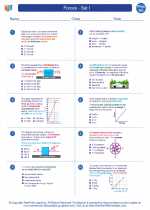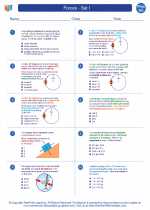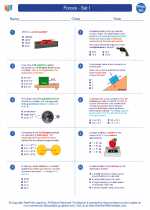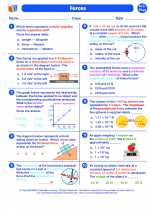Synthesis Reaction
A synthesis reaction is a type of chemical reaction in which two or more simple substances (elements or compounds) combine to form a more complex product.
General Form of Synthesis Reaction
The general form of a synthesis reaction is:
A + B → AB
Where A and B are the reactants, and AB is the product.
Examples of Synthesis Reactions
Some common examples of synthesis reactions include:
- Combination of elements: 2H2 + O2 → 2H2O
- Combination of an element and a compound: C + O2 → CO2
- Combination of two compounds: CaO + H2O → Ca(OH)2
Key Characteristics of Synthesis Reactions
- Synthesis reactions are characterized by the formation of a single product from multiple reactants.
- They are often exothermic, meaning they release energy in the form of heat.
- Synthesis reactions are commonly used in the synthesis of various chemical compounds and materials.
Study Guide
To understand synthesis reactions better, it's important to focus on the following key points:
- Identify the reactants and products in a synthesis reaction.
- Understand the general form of a synthesis reaction and recognize different types of synthesis reactions.
- Learn to balance synthesis reactions using the principles of conservation of mass.
- Practice writing and predicting the products of synthesis reactions based on the given reactants.
- Explore real-world examples of synthesis reactions and their applications in various fields such as chemistry, industry, and manufacturing.
By mastering the concept of synthesis reactions, you'll be able to analyze and predict chemical reactions more effectively, and apply this knowledge to practical scenarios in the field of chemistry.
.◂Physics Worksheets and Study Guides High School. Forces - Set I
Worksheet/Answer key Forces - Set I
Forces - Set I  Worksheet/Answer key
Worksheet/Answer key Forces - Set I
Forces - Set I  Worksheet/Answer key
Worksheet/Answer key Forces - Set I
Forces - Set I  Worksheet/Answer key
Worksheet/Answer key Forces - Set I
Forces - Set I 

 Worksheet/Answer key
Worksheet/Answer key
 Worksheet/Answer key
Worksheet/Answer key
 Worksheet/Answer key
Worksheet/Answer key

The resources above cover the following skills:
PHYSICS
Motion and Stability: Forces and Interactions
Identify and analyze forces responsible for changes in rotational motion and develop an understanding of the effect of rotational inertia on the motion of a rotating object (e.g., merry-go-round, spinning toy, spinning figure skater, stellar collapse [supernova], rapidly spinning pulsar).